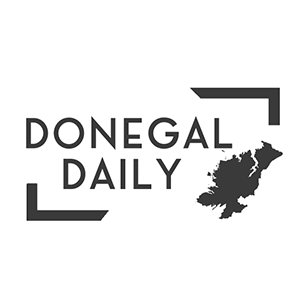FELIX HEALY SAT HIS Finn Harps squad down one Monday night in April 2005 in a search for honesty.
Two nights previously, Harps had lost 2-0 against Derry City at Finn Park.
Mark Farren and Alan Murphy hit the goals as Derry cruised before a red hot Ballybofey atmosphere.
Harps had won the First Division the previous season and went up full of confidence, but the ease with which Derry won concerned Healy.
Picture caption: Kevin McHugh of Finn Harps in action against Eddie McCallion of Derry City during the EA Sports Cup game between the teams in 2012. Derry City won the game 4-0. Picture by Gary Foy.
When Healy gathered his troops again at the scene of the crime, he looked around the Finn Park dressing room and asked a simple question to a room of 20 players.
‘How many people in here really believed before we played Derry that we’d win?’ Healy wondered.
His audience shuffled uncomfortably. Just two hands went up.
One was that of the 35-year-old Anthony Gorman and the other who believed was Michael Funston, then a raw 19-year-old.
The rest of a dressing room that was packed with experience kept their focus on the lino for fear of making eye contact.
“That is a serious problem,” Healy says now ahead of the 60th north west derby.
“That is still ingrained in a number of people who will be playing and it has been a part of the psyche at Harps for many years.”
In 59 attempts, Harps have beaten Derry just five times and two of those were in the Irish News Cup, a competition in the late 90s that was played using mainly reserve players.
Outside of those wins, only three victories have been posted by Harps, with two of those coming in the League Cup.
The League Cup wins book-end the brief list of Harps successes over City.
The first was that fateful August Sunday in 1997 when Sammy Johnston forever etched his named into Harps folklore.
Signed from Glenavon that summer, Johnston struck twice as Harps came from a goal down to win 2-1.
“A half-hit shot and being in the right place at the right time to slot it home,” was how Johnston described his goals in an interview five years on from his heroics.
It was the first time since Derry’s entry into the League of Ireland, 12 years previously, that Harps had beaten their neighbours in a competitive game.
“You’d have thought that we had won the World Cup that night Sammy Johnston hit the two goals,” says Paddy McGrenaghan, who was at Harps for all five wins over City.
“That meant so much from a Harps point of view. Finally we had beaten them and it was mental that game.”
The history makes for grim reading from a Harps perspective.
The two tribes go to war on Friday night before a packed Finn Park with Harps having won only once in 28 previous League meetings. They’ve managed six draws and lost 21 times in the League to their great rivals.
For Harps to win on Friday night, they’ll need a hero like Donal O’Brien in February 1998, when Harps recorded their only League win over Derry. O’Brien – who is now at Derry in a coaching capacity – rose at the Town End to head home a cross by Pascal Vaudequin.
https://wwwyoutube.com/watch?v=OWunpYpEOic
When Derry first arrived at Finn Park for a competitive game in December 1985, 7,000 jammed into the ground on a day when Harps took in £12,000 in gate receipts.
The experience was a jarring one as Derry won 7-2.
A year later, Harps bagged one of their half-a-dozen League draws with the Candystripes and it says much about the lopsided record that the goal by John McDaid – granted, which was a 25-yard cracker – is still talked about 30 years on.
https://wwwyoutube.com/watch?v=3cydX1O0SFY
Noel King has experiences on both sides of the north-west divide. As a player and manager with Derry City, he enjoyed several wins over Harps, but it’s from his spell as boss at Harps that has the derby etched in his mind.
In December 2003, the teams locked horns in a promotion relegation play-off.
The first leg at Finn Park was scoreless, setting up a winner-takes-all return game in Derry.
King believed firmly that it was written in the stars for him to guide Harps up and relegate City in doing so.
“The obvious thing in that game was trying to break the hoodoo – trying to get that one up on Derry that was going to put them down,” says the Dubliner.
It was Liam Coyle, though, who secured a dramatic win for City in front of a packed house and poisonous atmosphere at Brandywell.
In his final game for the club, the legendary striker scored the winner in extra-time after Kevin McHugh’s dramatic late equaliser had cancelled out Mark Farren’s opener. It was the last of Coyle’s 112 goals for the club – a record that stood until Farren netted his 113th in 2012 against Mervue.
https://wwwyoutube.com/watch?v=YIDvLUTgVPY
“Of all the derby games I played in, that was the biggest because of the importance of it all,” Coyle says.
“Look at what has happened in Derry since, with all the memories from Stephen Kenny’s years – that might never have happened had we not beaten Harps that night.”
Charlie McGeever master-minded four of the wins as Harps boss, with Gavin Dykes in charge of the other – the September 2000 League Cup win, when Alec Nesovic netted the only goal at Finn Park, which happens to be the last time Harps enjoyed derby day success.
“For a good majority, Derry City just had better players, and that is just putting it simply,” Coyle says. “Harps had a strong side under Charlie and they should maybe have beaten us a couple of more times in that era. But for the rest of it, Derry was just the better team.”
There’s a school of thought too that Derry have some sort of curse on Harps.
An Indian sign looms over Harps any time derby day arrives; so many teams have frozen when faced by the Candystripes.
“I definitely think there is a mental block with Harps,” Coyle says. “Even when Harps had their good teams, they couldn’t quite get a period of dominance over Derry.”
That’s not a notion to which Paddy McGrenaghan subscribes. The Fanad man played 393 times for Harps, but does admit that ‘there were games where we went there knowing we were in big trouble before we even kicked off’.
“They were a bogey team I suppose, but there was nothing in the way of mental blocks,” he says.
“We always went into those matches positive and optimistic.
“There were many days we went to play Derry and we had as good a team, if not a better one, than them and in fact we expected a lot of days to beat them.
“I just couldn’t put my finger on what happened in those games…”
From early on Friday, Ballybofey will be in the grip of derby fever.
Some 4,500 people will wedge into the rusting Navenny Street venue for the latest chapter of the rivalry.
“These are big games,” says King, the Republic of Ireland Under-21 manager now.
“You can feel the tension in it, whether there are 2,000 there or it’s a sell-out. That is the level of rivalry that is there.
“People elsewhere in the League, Dublin for example, don’t believe what it means up there. It’s a great football area and people are so passionate about their football.”
Tags:





